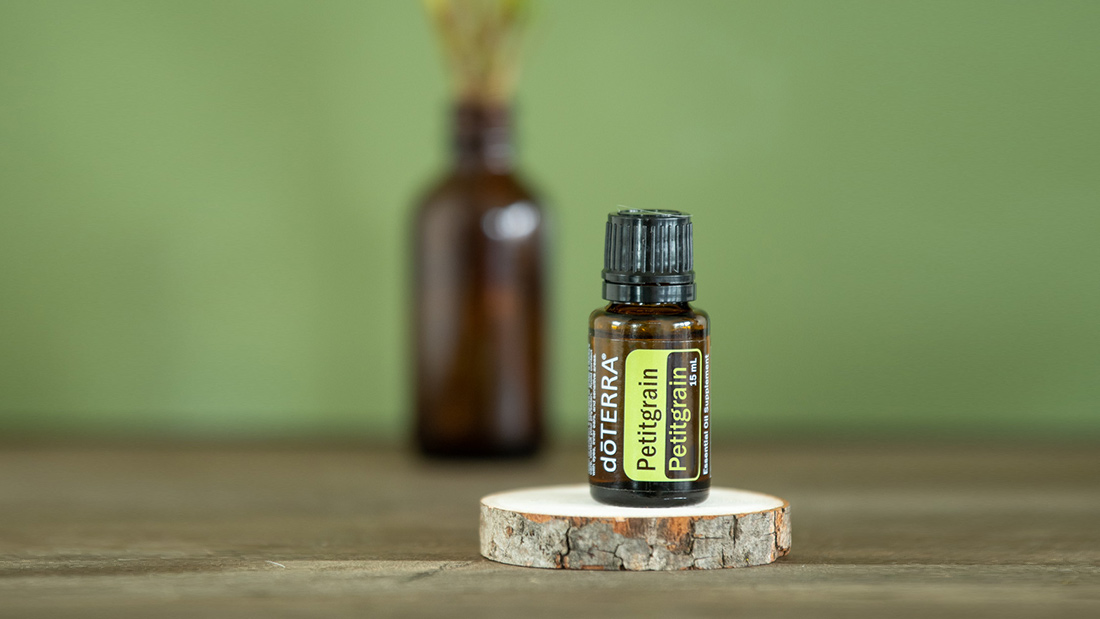Origin: a Latin derivative
meaning "Gift of the Earth."
Petitgrain Oil NHP Uses and Benefits

Petitgrain Oil Product Description
Derived from the bitter orange tree, Petitgrain essential oil offers a fresh, floral, and often herbaceous aroma that has been used in the perfume industry since the 18th century. It has also long been utilized in traditional holistic practices. It is this long, expert history that makes this essential oil both unique and efficacious in all manners of aromatic uses. Petitgrain essential oil is especially useful in aromatherapy for a variety of applications.*
*NPN: 80072499
Shop Petitgrain Oil
How Do I Use Petitgrain Oil?
- Personal Aroma: Petitgrain essential oil is a common ingredient in the perfume industry to give body sprays, fragrances, and lotions a fresh, herbaceous aroma. Petitgrain essential oil can be helpful in creating a calm, relaxed environment with its key aromatic notes, and you can take that environment wherever you go when you wear one drop of Petitgrain oil as a person pure-fume or cologne fragrance.
- Bedding Spray: Add five to ten drops of Petitgrain oil to a 30 mL spray bottle with water and use by spraying on your pillows and bedding in the evening to enjoy its scent while preparing for bed. Mist on other blankets throughout the house whenever a cozy space could use an extra dose of calming aroma.
- Aromatic Massage: The relaxing aroma of Petitgrain essential oil can also be a beneficial option to couple with massage. Dilute a few drops of Petitgrain oil with doTERRA Fractionated Coconut Oil before rubbing on the shoulders, neck, and bottoms of the feet, inhaling deeply to take in the aroma of Petitgrain oil.
- Diffusion: Want to create a calming atmosphere in your home, office, or classroom? Diffuse three to five drops of Petitgrain oil in the essential oil diffuser of your choice when you want to create the desired environment. You can also combine Petitgrain with other calming oils like Bergamot oil, Lavender oil, or Eucalyptus oil to further promote an even more relaxing atmosphere.
Petitgrain Oil in Aromatherapy*
Petitgrain essential oil is an especially efficacious essential oil to use in practices of aromatherapy. Petitgrain oil is used in aromatherapy:
- As a nervine/calmative.
- To help relieve joint/muscle pain associated with sprain, strain, and rheumatoid arthritis.
*NPN: 80072499
Fun Fact
The name Petitgrain is a French word that translates to “little grains.” It was given this name because the fruit of the bitter orange tree is quite small for a citrus fruit, being only about the size of a cherry.
What is Petitgrain Oil?
Petitgrain oil comes from the bitter orange tree, Citrus aurantium. Originally from Southern China, the bitter orange tree was brought to Paraguay in the 19th century, where it now flourishes. The bitter orange tree produces two different doTERRA essential oils: Neroli essential oil is derived from the blossoms of the bitter orange tree, and Petitgrain essential oil is taken from the tree’s twigs and leaves, which are steam distilled to produce a refreshing, floral, and herbaceous essential oil.
What Essential Oils Blend Well with Petitgrain oil?
As a citrus essential oil, Petitgrain oil will blend well with other citrus-based oils like Bergamot oil or Lemongrass oil. Petitgrain oil also blends well with warm essential oils such as Cinnamon Bark oil or Cassia oil. The fresh, floral notes of Petitgrain oil also make it a perfect companion for essential oils like Lavender oil, Geranium oil, or Eucalyptus oil.
Cautions
Not for oral use. Keep out of reach of children. External use only. Avoid contact with eyes and mucous membranes; if this happens, rinse thoroughly with vegetable oil. If accidental ingestion occurs, seek urgent medical attention or contact a Poison Control Center. Consult a health care practitioner prior to use if you have epilepsy or asthma, or if symptoms persist or worsen. If you are pregnant or breastfeeding do not use this product. Do not expose the applied area(s) to the sun for 24 to 48 hours after application. If you experience nausea, dizziness, headache, or an allergic reaction, discontinue use. For prolonged use, consult a healthcare practitioner.



